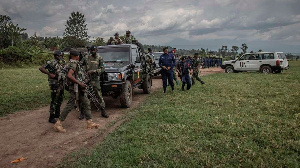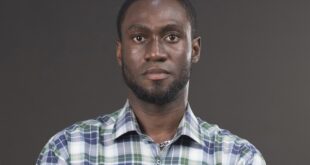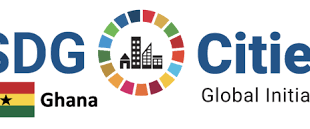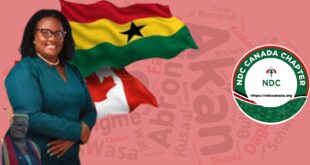At least 20 people have been killed in a new massacre in DR Congo’s eastern province of Ituri, a respected monitor said on Monday, adding that the notorious ADF militia were suspected.
Several houses were also burnt down in the attack.
The attack took place overnight in the village of Bwanasura in Irumu territory, the Kivu Security Tracker (KST) said on Twitter.
David Beiza, head of the Red Cross in Irumu, said volunteers from his organisation “have counted 36 bodies” at the site of the massacre.
Ituri and neighbouring North Kivu province are struggling with attacks by armed groups, many of them a legacy of wars in the Democratic Republic of Congo’s east.
KST said the Allied Democratic Forces (ADF) — a group that the so-called Islamic State describes as its affiliate — was suspected to have been behind the killing.
The heavily militarised province of Ituri is increasingly recording deadly attacks, despite joint operations between the Congolese and Ugandan armies for more than six months in the province and in North Kivu. The Congolese and Ugandan militaries launched the third phase of operations against the Ugandan ADF rebels on 1 June
Beiza said: “ADF rebels arrived around 8 pm. They moved calmly. Fortunately, many residents were able to flee.”
Dieudonne Malangay, a civil society leader in the district of Walese Vonkutu said the army was “late” in responding. “Bullets are still flying” in the area, he said.
On Monday, M23 rebels bombarded an army position at Bugusa in North Kivu’s Rutshuru territory killing two soldiers and wounding five, the military said in a statement.
The statement signed by the military governor’s spokesman General Sylvain Ekenge suggested Rwanda was supplying weapons to the rebels.
“The use of long-range artillery shows the support M23 receives from its natural ally,” the general said.
At least 20 people have been killed in a new massacre in DR Congo’s eastern province of Ituri, a respected monitor said on Monday, adding that the notorious ADF militia were suspected.
Several houses were also burnt down in the attack.
The attack took place overnight in the village of Bwanasura in Irumu territory, the Kivu Security Tracker (KST) said on Twitter.
David Beiza, head of the Red Cross in Irumu, said volunteers from his organisation “have counted 36 bodies” at the site of the massacre.
Internal displaced children, fleeing the recent clashes between M23 rebels and Congolese soldiers, eat a meal prepared by volunteers in Kanyarushinya north of Goma on May 27, 2022. PHOTO | AUBIN MUKONI | AFP
Ituri and neighbouring North Kivu province are struggling with attacks by armed groups, many of them a legacy of wars in the Democratic Republic of Congo’s east.
KST said the Allied Democratic Forces (ADF) — a group that the so-called Islamic State describes as its affiliate — was suspected to have been behind the killing.
The heavily militarised province of Ituri is increasingly recording deadly attacks, despite joint operations between the Congolese and Ugandan armies for more than six months in the province and in North Kivu. The Congolese and Ugandan militaries launched the third phase of operations against the Ugandan ADF rebels on 1 June.
Beiza said: “ADF rebels arrived around 8 pm. They moved calmly. Fortunately, many residents were able to flee.”
Dieudonne Malangay, a civil society leader in the district of Walese Vonkutu said the army was “late” in responding. “Bullets are still flying” in the area, he said.
On Monday, M23 rebels bombarded an army position at Bugusa in North Kivu’s Rutshuru territory killing two soldiers and wounding five, the military said in a statement.
The statement signed by the military governor’s spokesman General Sylvain Ekenge suggested Rwanda was supplying weapons to the rebels.
“The use of long-range artillery shows the support M23 receives from its natural ally,” the general said.
Internally displace people from the Kibumba area near the North Kivu city of Goma, arrive on May 25, 2022 at the Kunyaruchinya school trying to shelter from the ongoing clashes between the Congolese Army and the M23 rebels. PHOTO | ARLETTE BASHIZI | AFP
Fighting erupted in May between the army and the M23, a primarily Congolese Tutsi group. Kinshasa has repeatedly accused Kigali of backing the M23, although Rwanda has denied the charge.
Congolese President Felix Tshisekedi on Sunday said he had “no doubt” about Rwanda’s support for the rebels, but that he hoped for better relations with Kigali.
The ADF has been blamed for massacres, kidnappings and looting dating back to 2013, with a death toll estimated in the thousands.
Ituri and North Kivu have been under a “state of siege” since May last year — a measure placing army chiefs in positions of authority to speed up efforts to improve security.
The ADF was also targeted in a joint operation launched last November by government and Ugandan forces following bomb attacks in the Ugandan capital Kampala.
The operation, which was due to end on May 31, has been extended by two months.
Despite the crackdown, the ADF’s attacks have continued — experts in March said the group had moved further inland after coming under pressure at the border.
At least 1,300 civilians have died in Irumu and Beni in North Kivu since the “state of siege” was introduced, according to local elected officials.
In March, at least 30 people were killed by suspected rebels in North Kivu and more than 50 people died in a two-day assault on villages in Irumu.
In May, at least 42 people were killed in ADF-attributed attacks at Bulongo and Beu-Manyama in North Kivu.
The ADF is historically a Ugandan rebel coalition whose biggest group comprised Muslims opposed to President Yoweri Museveni.
Established in eastern DRC in 1995, the group became the deadliest of scores of outlawed forces in the deeply troubled region.
Since April 2019, some ADF attacks in eastern DRC have been claimed by the Islamic State, which describes the group as its local offshoot, the Islamic State Central Africa Province.
The United States last year placed the ADF on its list of “terrorist” organisations linked to IS.
More than 120 armed groups roam eastern DRC.
Ituri is also suffering from ethnic attacks led by CODECO militia, which claims to represent the Lendu community against the rival Hema group and the security forces.
Source: theeastafrican.co.ke
 Home Of Ghana News Ghana News, Entertainment And More
Home Of Ghana News Ghana News, Entertainment And More





